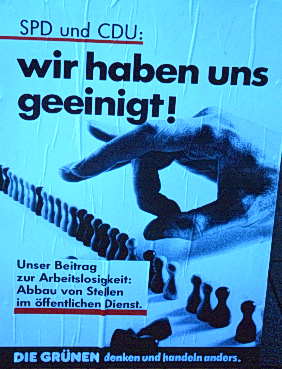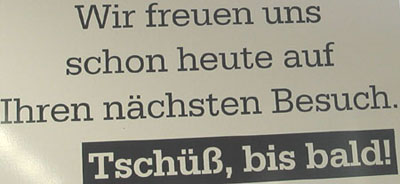Reflexive Pronouns, Verbs (Reflexivpronomen, reflexive Verben)
 If the subject and direct or indirect object are the same person or thing, English uses a special set of pronouns:The Reflexive in English:
If the subject and direct or indirect object are the same person or thing, English uses a special set of pronouns:The Reflexive in English:
| myself |
ourselves |
| yourself |
yourselves |
| himself |
|
| herself |
themselves |
| itself |
|
Thus:
| I could kick myself. |
| Did he really kill himself? |
| Suit yourself. |
| We bought ourselves a new car. |
| She found herself a new friend. |
Some verbs are reflexive by convention, even though the meaning is not logically reflexive:
| Behave yourselves. |
| He conducted himself with dignity. |
| She seems to be enjoying herself. |
Note that not all words ending in
-self are reflexive. They can be an adverb meaning “without others,” as in “I’d rather do it myself” (For this function, German uses
“selbst” [or “selber”]: “Ich mache es lieber selbst”).
The Reflexive in German:
The reflexive pronouns are different only in the third person and in the formal “Sie” (which is historically derived from the third person plural)
| Nom. |
Acc. |
Dat. |
|
Nom. |
Acc. |
Dat. |
| ich |
mich |
mir |
|
wir |
uns |
uns |
| du |
dich |
dir |
|
ihr |
euch |
euch |
|
|
|
|
Sie |
sich |
sich |
| er |
sich |
sich |
|
|
|
|
| sie |
sich |
sich |
|
sie |
sich |
sich |
| es |
sich |
sich |
|
|
|
|
Most transitive verbs can be used reflexively when the meaning calls for it. Note the differences:
| Er sieht mich im Spiegel. He sees me in the mirror. |
| Er sieht sich im Spiegel. He sees himself in the mirror. |
|
| Sie wäscht das Kind gründlich. She washes the child thoroughly. |
| Sie wäscht sich gründlich. She washes herself thoroughly. |
|
| Ich liebe nur dich. I love only you. |
| Ich liebe nur mich. I love only myself. |
|
| Setzen Sie es auf den Stuhl. Set it down on the chair. |
| Setzen Sie sich auf den Stuhl. Sit down on the chair. |
|
| Sie verzeiht mir. She forgives me. |
| Ich kann mir nicht verzeihen. I can’t forgive myself. |
|
| Sie widerspricht ihrem Chef. She contradicts her boss. |
| Du widersprichst dir. You’re contradicting yourself. |
|
| Ich gönne dir ein zweites Stück Kuchen. I’ll allow (grant) you a second piece of cake. |
| Ich gönne mir einen Ruhetag. I’ll allow myself (treat myself to) a day off. |
In the plural, the reflexive form can also mean
“each other” (“one another”):
|
|
 |
|
We’ve come to an agreement. Our contribution to unemployment: cutting governmental positions. |
|
| Wir lieben uns. We love each other. |
| Sie küssen sich. They kiss each other. |
| Wir hassen uns. We hate each other. |
| Ihr vertragt euch gut. Y’all get along well with each other. |
| Wir treffen uns jeden Tag. We meet every day. |
| Sie streiten sich um die Erbschaft. They are fighting with each other over the inheritance. |
Not all German reflexives have a corresponding construction in English:
| Sie ziehen sich schnell an. They get dressed quickly. |
| Er kämmt sich. He combs his hair. |
| Ich rasiere mich morgens. I shave in the morning. |
| Sie schminkt sich nur am Wochenende. She puts on make-up only on the weekend. |
The dative reflexive can be used to indicate that the action takes place for the subject’s benefit:
| Kaufen Sie sich einen neuen Wagen? Are you buying yourself a new car? |
| Ich will mir etwas Schönes finden. I want to find something nice for myself. |
| Sie setzt sich die Kontaktlinsen ein. She puts in her contacts. |
| Mach dir keine Sorge darüber. Don’t worry yourself about it. |
| Du sollst dir eine wärmere Jacke anziehen. You should put on a warmer jacket. |
To indicate
parts of one’s own body, one shows possession with the dative reflexive:
1
| Ich habe mir den Finger verletzt. I injured my finger. |
| Er rasiert sich den Kopf. He shaves his head. |
| Er kämmt sich die Haare. He combs his hair. |
| Sie färbt sich die Haare. She dyes her hair. |
| Du sollst dir die Zähne putzen. You ought to brush your teeth. |
| Ich wasche mir die Hände in Unschuld. I will wash my hands in innocency (Psalms 26: 6) |
Some verbs take on a different meaning in the reflexive (dative or accusative). Note the following contrasts:
| Ich erinnere ihn an seinen Onkel. I remind him of his uncle. |
| Ich erinnere mich an seinen Onkel. I remember his uncle. |
|
| Ich habe ihm meine Frau vorgestellt. I introduced my wife to him. |
| Kannst du dir so etwas vorstellen? Can you imagine such a thing? |
|
| Dein Besuch hat uns gefreut. We were delighted by your visit. |
| Wir freuen uns über deinen Besuch. We are happy about your visit. |
| Wir freuen uns auf deinen Besuch. We are looking forward to your visit. |
|
|
 |
|
|
| Ich fühle den Wind. I feel the wind. |
| Ich fühle mich nicht wohl. I don’t feel well. |
|
| Sie trifft ihn in der Stadt. She meets (or: encounters) him in town. |
| Sie trifft sich mit ihm. She meets him (by arrangement). |
|
| Was ärgert dich jetzt? What’s annoying you now? |
| Ärgern Sie sich immernoch darüber? Are you still mad about that? |
|
| Du langweilst mich. You’re boring me. |
| Langweilst du dich? Are you bored? |
|
| Deine Probleme interessieren mich nicht. Your problems don’t interest me. |
| Ich interessiere mich für Geschichte. I’m interested in history. |
|
| Sein Fall beschäftigt uns sehr. His case is very much on our minds. |
| Ich beschäftige mich mit meinen Briefmarken. I occupy myself with my stamps. |
|
| Seine Antwort wundert mich. His answer surprises me. |
| Sie wundert sich über seine Antwort. She is surprised by his answer. |
|
| Seine Probleme kümmern mich nicht. His problems don’t concern me. |
| Sie kümmert sich um ihr Kind. She attends to her child. |
|
| Er unterhält uns mit seinen Geschichten. He entertains us with his stories. |
| Ich unterhalte mich gern mit ihr. I like to talk (have a discussion) with her. |
|
| Er hat seine Familie verlassen. He left his family. |
| Ich verlasse mich auf dich. I put my trust in you. |
|
| Sie amüsieren uns mit ihren Skizzen. They amuse us with their sketches. |
| Wir haben uns auf der Party gut amüsiert. We enjoyed ourselves at the party a lot. |
|
|
 |
|
Relax. You’re on the island for every season. Cyprus |
|
And then there are a number of verbs that are (almost)
always reflexive. Here are some that take the
accusative:
| Ruhen Sie sich zuerst aus. Rest up first. |
| Ich bedanke mich bei ihm. I thank him. |
| Ich muss mich beeilen. I have to hurry. |
| Sie bewerben sich um eine Stelle. They’re applying for a position. |
| Das Kind benimmt sich erstaunlich gut. The child behaves itself surprisingly well. |
| Du sollst dich bei ihr entschuldigen. You should apologize to her. |
| Ich brauche eine Woche, mich zu erholen. I need a week to recover. |
| Wie hast du dich erkältet? How did you catch cold? |
| Fürchtest du dich vor dem Hund? Are you afraid of the dog? |
| Ich gewöhne mich langsam an seine Stimme. I’m slowly getting used to his voice. |
| Wo kann ich mich hinlegen? Where can I lie down? |
| Ich kenne mich hier gut aus. I know my way around here well. |
| Die Reise hat sich nicht gelohnt. The trip wasn’t worth it. |
| Er räuspert sich. He clears his throat. |
| Sie sollen sich schämen! You should be ashamed! |
| Ich will mich nur umsehen (umschauen). I just want to look around. |
| Der Zug hat sich verspätet. The train was late. |
| Hast du dich nicht mit ihm zum Tennis verabredet? Didn’t you make a date with him to play tennis? |
| Ich habe mich in meine Kusine verliebt. I’ve fallen in love with my cousin. |
And some that take the
dative:
| Ich will es mir ansehen. I want to take a look at it. |
| Er bildet sich ein, ein großer Intellektueller zu sein. He (falsely) imagines that he is a great intellectual. |
| Ich muss mir das überlegen. I’ll have to think that over. |
| Sie hat es sich anders überlegt. She changed her mind. |
| Ich kann mir keine teueren Bücher leisten. I can’t afford any expensive books. |
|
|
 |
|
Either we change ourselves, or the climate will change even faster |
|
Some verbs always require an object, even when no actual object is implied. Then the verb becomes reflexive. This structure is less common in English than in German, but you do get things like: “The answer suggested itself very quickly.” Note the following contrasts:
| Sie öffnete die Tür. She opened the door. |
| Die Tür öffnete sich plötzlich. The door opened suddenly. |
|
| Er bewegt das Bein. He moves his leg. |
| Etwas hat sich bewegt. Something moved. |
|
| Wir ändern unsre Pläne. We’re changing our plans. |
| Alles hat sich geändert. Everything has changed. |
|
| Sie dreht den Spiegel gegen die Wand. She turns the mirror to the wall. |
| Die Erde dreht sich um ihre Achse. The earth turns on its axis. |
|
| Sie verkaufen viele Bücher. They sell a lot of books. |
| Diese Bücher verkaufen sich wie warme Semmeln. These books sell like hotcakes. |
|
|
 |
|
The new pension legislation: For younger people, much will improve. For most pensioners, everything will stay as it was. |
|
The reflexive construction
“sich lassen” can be used as a substitute for the passive when saying that something can or cannot be done:
| Eine Lösung lässt sich finden. A solution can be found. |
| Das lässt sich leicht machen. That can be done easily. |
| Die Tür lässt sich nicht aufmachen. The door can’t be opened. |
| Der Wagen lässt sich schnell reparieren. The car can be fixed quickly. |
| Ein Skandal lässt sich nicht vermeiden. A scandal can’t be avoided. |
|
|
 |
|
The Jeep Cherokee in a new design. One more reason to be seen more often in civilization. |
|
The prefix
“ver-“, combined with the reflexive, can often mean that the action is performed wrongly:
| Ich habe mich verlaufen. I got lost (on foot). |
| Ich habe mich verfahren. I got lost (while driving). |
| Sie hat sich verschluckt. She swallowed the wrong way. |
| Du hast dich vertippt. You made a typing error. |
| Haben Sie sich nicht verzählt? Didn’t you count wrong? |
| Er hat sich versprochen. He misspoke. |
| Wir haben uns verrechnet. We miscalculated. |
The prefix
“hin-“, combined with the accusative reflexive phrase
“vor sich”, can mean that the action is without thought or purpose, often rendered in English as “to oneself,” “away,” or “along”:
| Er pfeift vor sich hin. He whistles to himself. |
| Die alte Frau brummt vor sich hin. The old lady grumbles to herself. |
| Du murmelst vor dich him. You’re mumbling to yourself. |
| Sie quatschen vor sich hin. They blather away. |
| Er duselt (döst) vor sich hin. He’s dozing (nodding) away (is half asleep). |
| Der Jobmarkt kriecht vor sich hin. The job-market crawls along. |
|
|
 |
|
Which of our four seasons are you most looking forward to? |
|
The dative is also used to show possession, especially of body parts, even when the action is not reflexive:
| Er hat ihr die Nase gebrochen. He broke her nose. |
| Ich wasche ihm den Kopf. “I’ll wash his head” (= I’m going to give him a piece of my mind). |
| Sie putzt ihm die Zähne. She brushes his teeth. |
]]>
If the subject and direct or indirect object are the same person or thing, English uses a special set of pronouns:The Reflexive in English:
